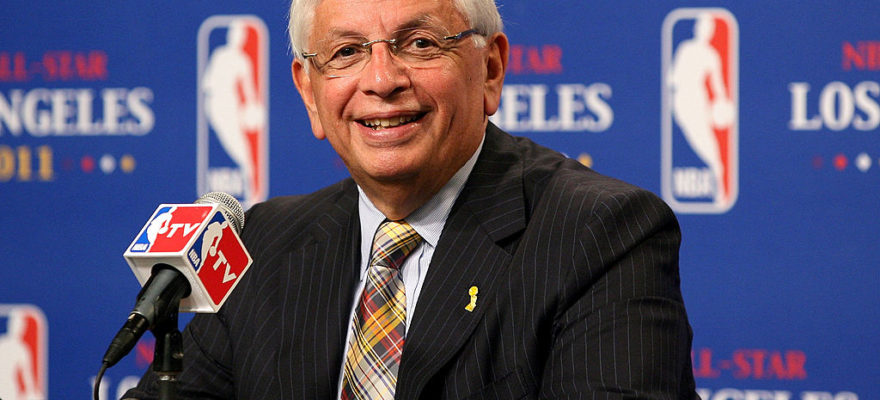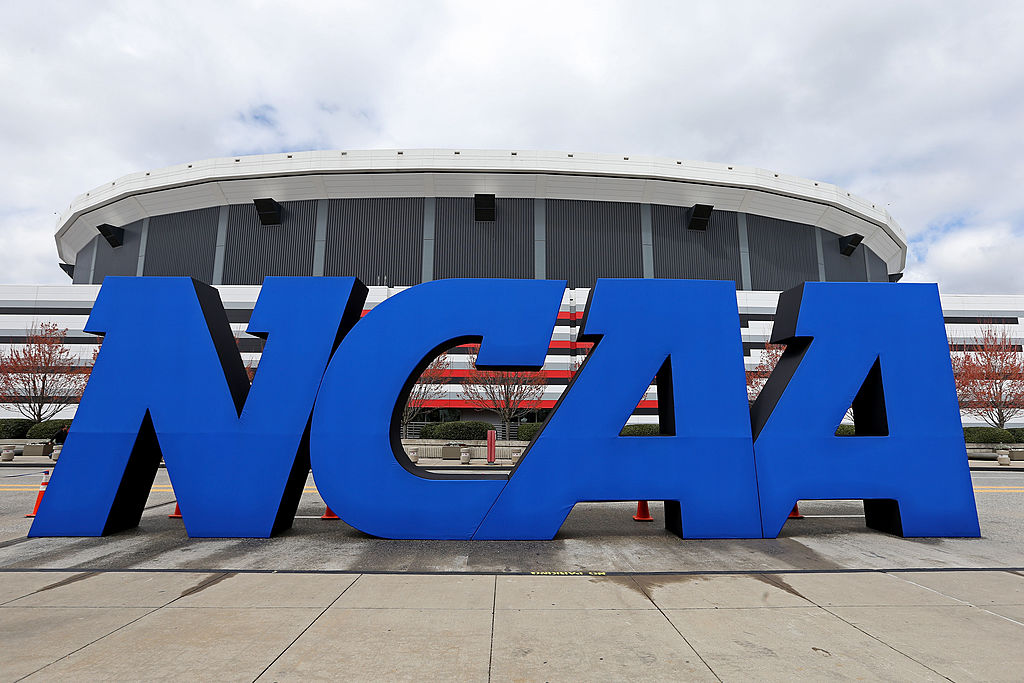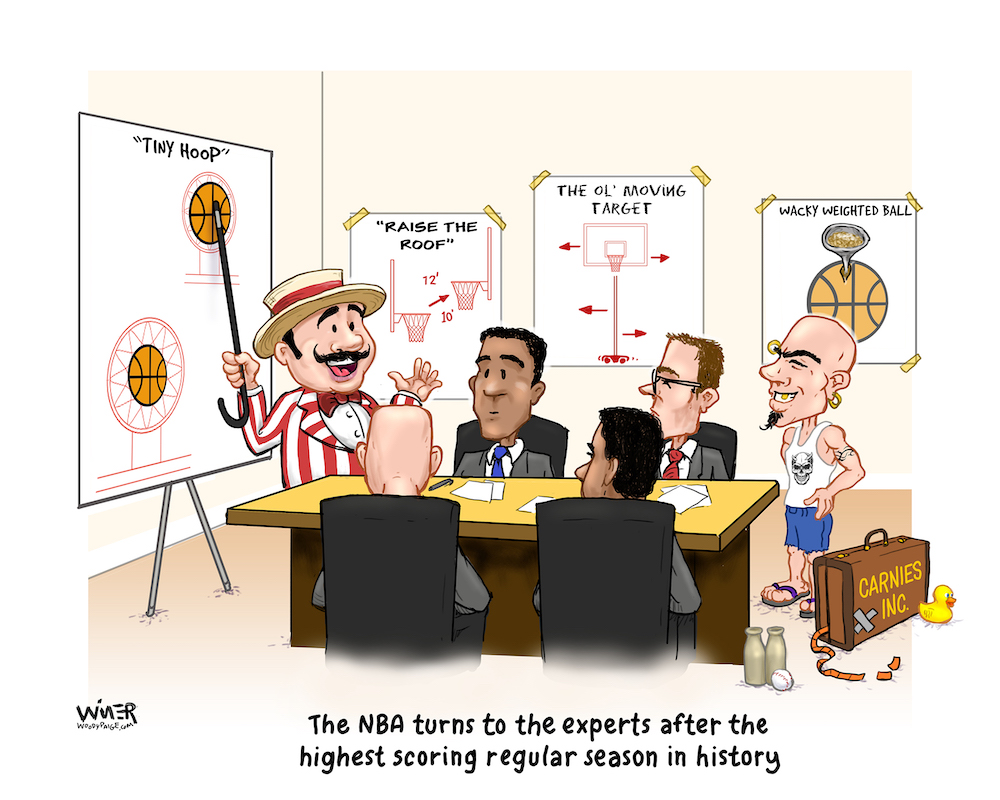On Monday night, the Denver Nuggets’ Serbian center, 24-year-old Nikola Jokic, went off for 47 points in a win over the Hawks in Atlanta. The 7-footer underscored the versatility of his game, hitting four 3-pointers and again demonstrating his passing ability and his uncanny vision on the floor.
It’s all at the heart of why he was the franchise’s second first-team all-NBA choice last season, doing it 41 years after David “Skywalker” Thompson.
And he’s doing it in a league now heavily populated by other Europeans and additional players born outside the U.S., whether Giannis Antetokounmpo, Luka Doncic, Joel Embiid, Pascal Siakam and Kristaps Porzingis … and on and on.
The internationalization of the talent pool has been great for the game and for the league’s business, and the NBA said there were 108 international players from 38 countries on opening night rosters this season. The total number of nations is more stunning than the head count. (I’m not certain I could name 38 nations. Just kidding. Kind of…)
This seemed unfathomable in the early seasons of the league’s revolution – the Magic/Bird/Jordan era. And, yes, in the early years of David Stern’s 30-year run as NBA commissioner.
In the wake of Stern’s death on New Year’s Day, I’m telling this story not to attempt to diminish his legacy and impact, but to emphasize how adaptive and how visionary he turned out to be.
The internationalization of the talent pool was inevitable, as it was for the National Hockey League under one-time Stern aide de camp Gary Bettman, who has been NHL commissioner since 1993.
But both men were instrumental in not just facing reality, but taking advantage of it.
Bettman had to battle even more of a heels-in-the-sand mentality among many of hockey’s traditionalists, whether in front offices, locker rooms, the media or broadcast booths.
Stern had been NBA commissioner for two years at the time of the 1986 draft.
I was at the exhibit hall adjacent to Portland’s Memorial Coliseum, where the Trail Blazers played host to a viewing party.
Brad Daugherty went No. 1 overall to the Cavaliers and Len Bias No. 2 to the Celtics, and others in the first round included Chuck Person, Kenny Walker, Roy Tarpley, Ron Harper, Johnny Dawkins, John Salley, playground legend Pearl Washington, Dell Curry and Scott Skiles. Second-round picks included Mark Price, Greg Dreiling, Dennis Rodman, Kevin Duckworth, Nate McMillan, David Wingate and Jeff Hornacek.
So that was a pretty good draft.
Among those choices, the Trail Blazers claimed Walter Berry of St. John’s at No. 14 overall. (Here’s the foreshadowing irony: Berry was an NBA washout and was out of the league in two years, but went to Europe and was a long-time star there.)
The Trail Blazers also had the final choice of the first round.
Stern stepped up to the podium and noted that, with the 24th pick of the 1986 draft …
He slipped in a dry “Americas Game” reference to the NBA before disclosing that the Blazers had selected “Arvydas Sabonis of the Soviet Union.”
It was as if it were a joke.
Nobody with a brain doubted the talent of the 7-foot-3 center, then only 21. He passed like a point guard, shot like a forward and dominated inside like one of the league’s top big men.
Yet it was a lightning bolt.
Given the geopolitics of the time, it seemed almost as outlandish as if the Blazers had drafted Karol Józef Wojtyła – Pope John Paul II.
Blazers executive Bucky Buckwalter was way ahead of his time in first looking to Europe and also thinking globally, and he never has been given sufficient credit for nudging the NBA in that direction.
We take it so for granted, but it was even more audacious than it seems now because the Iron Curtain still was up, the USSR was still in control of Eastern Europe, and we were essentially ignorant of the fact that athletes from the Baltics – including Lithuanian basketball stars Sabonis and Sarunas Marciulionis – could be less than enthusiastic “Soviets.”
For the next nine years after that draft, the NBA changed as the Blazers waited for Sabonis.
In the spring of 1988, he came to Portland to get help from Blazers physicians and staff in rehabilitating a horrific Achilles injury.
As he prepared to be on the Soviet Union’s 1988 Summer Olympics gold medal team at Seoul, USA coach John Thompson – guiding the last team made up of collegians – criticized the Blazers for their part in his recovery.
This is what Thompson told my Oregonian sportswriter colleague David Kahn in May 1988:
“Realistically, I see Sabonis as being a fulfillment of Lenin’s prophecy. The capitalists are selling the rope that they can hang us with. I personally feel we’re being used.
I understand when you have a national tragedy, like Chernobyl, that we have to deal with it from a humanitarian standpoint; I respect that (American) doctor who went over to help with their national incident. But this, to me, is a little bit different. We are in direct competition with them. To prepare Sabonis to play against us just isn’t right.”
Kahn, later the Minnesota Timberwolves’ president of basketball operations, called Stern for comment.
“Coach Thompson is a great coach,” Stern told Kahn, “but I’m glad he’s not our Secretary of State, conducting our foreign policy.”
Stern was coming around.
Sabonis made it to Seoul.
Under the incredibly lax security at the time, Sabonis actually waved me into the USSR team’s locker room after the gold-medal victory over Yugoslavia. (The USSR had beaten the Americans, led by Navy’s David Robinson, in the semifinals.) The door opened after we could hear many of the players singing what I was told were Baltic folk songs in celebration.
I noted in my column:
In between smiles and flashes, (Sabonis) said he was ‘very much happy’ to win the gold medal that was hanging around his neck.
“Sixteen years I give for this, first gold medal for Russia in 16 years,” Sabonis said. . .
Sabonis said he was aware that Buckwalter was in Seoul negotiating with Soviet sports officials about possibly signing the Lithuanian center. He said he hadn’t yet spoken with Buckwalter, but he had a souvenir Trail Blazers’ pen someone had given him after the game.
“I want to play in Portland,” Sabonis said. “But it’s not my problem.”
His English was raw at the time, and I think he meant he wasn’t preoccupied with it. He could have a fine career without the NBA, but if he could get there, great.
In fact, he didn’t come to the NBA for seven more years, and by the time he was in the league, his prime was in the rear-view mirror.
After the dissolution of the USSR, he played in Spain, where he was handsomely paid and the shorter schedule suited him.
He and Marciulionis — and current Nuggets general manager Arturas Karnisovas — were on the proud Lithuanian team that won the Bronze medal at Barcelona, finishing behind the Dream Team and Croatia, with NBA players Toni Kukoc and Drazen Petrovic.
But Sabonis finally made it to Portland in 1995, when he was 30, and played seven seasons for the Blazers, averaging 12 points, 7 rebounds and 2 assists.
The movement of international players to the NBA was underway, but not yet in high gear. In Dirk Nowitzki’s rookie season, 1998-99, for example, he was one of 30 international players in the league.
Full circle: Sabonis’ son, Domantas, was born in Portland and now is a rookie with the Pacers after playing collegiately at Gonzaga. He is not considered one of the league’s international players.
In the 1980s, the uncanny, multi-talented big man — Sabonis — stayed in Europe. Now, the uncanny, multi-talented big man — Jokic — always was destined for the NBA.
It’s the world’s game.
David Stern not only knew that; he was part of making it happen.
That might have been his greatest accomplishment.
About Terry: Terry Frei is the author of seven books. His novels are Olympic Affair and The Witch’s Season, and among his five non-fiction works are Horns, Hogs, and Nixon Coming; Third Down and a War to Go; and ’77: Denver, the Broncos, and a Coming of Age. Information is available on his web site, terryfrei.com. His woodypaige.com archive can be found here.






















